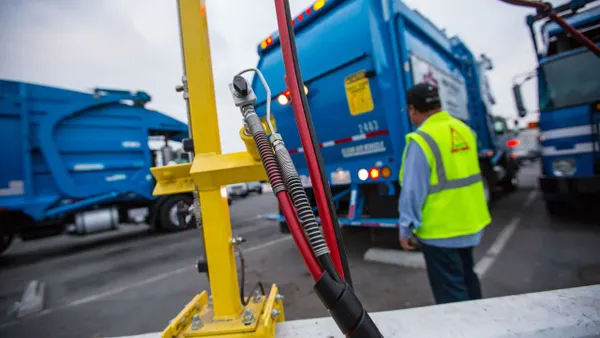Dive Brief:
- The newly introduced House Bill 1114 aims to halve food waste in Washington state by 2030, relative to 2015 levels. It is scheduled for an executive session on Thursday in the Committee on Environment & Energy.
- The bill would require the state's Department of Ecology to "develop and adopt a state wasted food reduction and food waste diversion plan" by October 2020. It does not directly mandate action by specific generators.
- As part of the initiative, the bill would authorize food waste reduction and diversion to be included in state and local activities funded by the Waste Reduction, Recycling, and Litter Control Account; the Local Toxics Control Account; and through grants generated from hazardous substances tax revenue.
Dive Insight:
Co-sponsored by Reps. Beth Doglio, Vandana Slatter and Jake Fey, the proposed legislation calls for the Department of Ecology to prioritize a multitude of strategies to prevent and reduce food waste from residents and businesses. These include matching edible food with food banks and other distributors as well as supporting productive uses of inedible food waste — including animal feed, energy production through anaerobic digestion, and off-site or on-site management (i.e., composting, vermicomposting or biological systems).
Furthermore, HB 114 would require that the food waste plan:
-
Recommend a regulatory environment that optimizes processes to rescue edible food;
-
Recommend a funding environment which provides food waste prevention resources and furthers the development of additional capacity;
-
Avoid placing burdensome regulations on the hunger relief system and ensure that food waste organizations retain discretion to accept or reject donations;
-
Provide state technical support for food waste prevention and food waste recovery/rescue organizations; and
-
Support food waste education and outreach efforts in K-12 schools.
The bill also directs the Department of Ecology to solicit feedback from the public and from interested stakeholders — and, if necessary, assemble a stakeholder advisory panel consisting, at minimum, of representatives from "local government health departments, local government solid waste departments, food banks, hunger-focused nonprofit organizations, waste-focused nonprofit organizations, K-12 public education, and food businesses or food business associations."
"[R]ecent estimates indicate that seventeen percent of all garbage sent to Washington disposal facilities is food waste, including eight percent that is food that was determined to be edible at the time of disposal,” HB 1114 notes. “By establishing state wasted food reduction goals and developing a state wasted food reduction strategy, it is the intent of the legislature to continue its national leadership in solid waste reduction efforts."
While parts of Washington, including Seattle and much of King County, have already implemented food waste programs, a robust statewide reduction and recovery initiative could make an even greater dent in landfill volumes.
The bill echoes parallel food waste reduction targets set in recent years: the EPA and USDA have also launched a joint agreement to cut food waste by 50% by 2030, as have the Pacific Coast Collaborative — a consortium of West Coast governments from the U.S. and Canada — and the UN.
Like these other 2030 commitments, HB 1114 is non-binding — and, as seen recently in New Jersey (which has its own 2030 goal of reducing food waste by 50%), this can make for slow and sometimes ineffectual progress. Whether this legislation leads to tangible action if passed — or becomes similarly mired in broad, well-intentioned talking points — remains to be seen.










